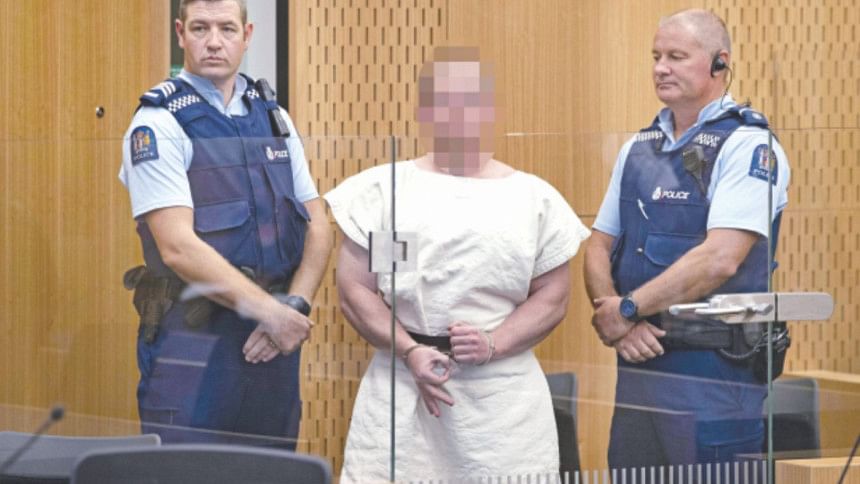The growing threat of white nationalism

♦ Experts say 'white genocide' fears compounded by immigration uniting fragmented 'Europeans'
♦ Rise of far-right and anti-immigration leadership in Europe and US boosting extremists
♦ Attacker hailed Trump as 'a symbol of renewed white identity and common purpose'
The massacre of Muslims at New Zealand mosques on Friday demonstrated the global reach of a white nationalist movement that preaches an imagined "European" ideal, rejects immigration and shares often vicious threats over the internet.
It's leaderless, fragmented, and relies for attention on lone-wolf type attackers like the 28-year-old Australian loner who allegedly killed 49 people Friday in Christchurch, explaining in a manifesto that he wants to "crush immigration" and revenge terror attacks on Europe.
But experts say it is a cohesive movement bound together online that stretches across Europe into Russia, has a deep following in the US and Canada, and as Friday's attack showed, is present in Australia and New Zealand.
They say it poses as much of an international threat as Islamic extremism, and even more so in the United States where white nationalist attacks have outpaced those by jihadists for years.
"White nationalism and far-right extremism is the most prominent extremist threat facing the United States today, and indeed it is a worldwide phenomenon," said Brian Levin, director of the Center for the Study of Hate and Extremism at California State University, San Bernardino.
"These folks fear demographic change. They use the term white genocide," he said. The white nationalist movement has roots in concepts espoused decades ago by European and American fascists and neo-Nazis.
French historian Nicolas Lebourg noted that the Christchurch suspect's manifesto cited British 1930s fascist Oswald Mosley, who developed the idea of a planet organized by race.
His use of the word "Europeans" for whites was first promoted in the late 1940s by American neo-Nazi Francis Parker Yockey.
"White genocide" is an idea that appeared around 1972 in the United States, Lebourg noted, and was then popularized in Europe by French writer Renaud Camus.
Indeed, the suspect's manifesto was titled "The Great Replacement," the title of a 2011 book by Camus, popular in white nationalist circles, that argued that non-white immigrants are supplanting white Europeans.
But their ideas are not uniform -- some white nationalists are anti-Muslim, some anti-Jewish, some capitalist, others socialist.
What unites them today, analysts say, is their fundamental opposition to immigration.
Vanderbilt University professor Sophie Bjork-James said a common fear was that white Christians could become minorities in societies they have dominated for centuries.
This has given rise to movements like the France-rooted "Identitarians," and Identity Evropa in the United States.
White nationalists have been further emboldened by the rise of politicians espousing traditionalist views and a tough line on immigration -- from Marine Le Pen in France and Viktor Orban in Hungary to Russian President Vladimir Putin; and the UKIP party in Britain.
The same holds true in the United States where President Donald Trump campaigned for the White House on an anti-immigration platform, backed by an overwhelmingly white voter base.
The Christchurch suspect called Trump "a symbol of renewed white identity and common purpose."
While he was swift to condemn the massacre, Trump courted controversy once again on Friday by saying he did not think it showed white nationalism to be a growing problem worldwide.
"I don't really. I think it's a small group of people," he told reporters in the Oval Office.
Bjork-James said the internet, especially sites like GAB and Stormfront, have helped build a global community for the otherwise disparate white nationalists.
It was filled with comments early Friday on the Christchurch attack, with some questioning the murder of women and children.
One commenter rejected the debate, she noted, by saying chillingly: "Invaders are not innocent people."
She said overall the movement operates consciously as a "leaderless resistance," whose members aimed to inspire each other into action.
"The lone-wolf attack is actually a part of a global strategy," said Bjork-James.
The Christchurch suspect wrote that he took inspiration from other white nationalists who undertook mass killings. He cited Anders Breivik, who slaughtered 77 people in Norway in 2011; Dylann Roof, who killed nine African-Americans in a US church in 2015; Alexandre Bissonnette, who murdered six in a 2017 attack on a Canadian mosque; and others like them.
But Lebourg said that attacks more recently appear to have become part of a cycle of revenge, especially since the jihadist bombings that targeted France in 2015.
The suspect's manifesto supports that: he cites revenge for historical events and recent Islamic extremist attacks multiple times. The 2015 attacks were "a tipping point for all the supremacists," Lebourg said. "Now revenge is in people's heads."

 For all latest news, follow The Daily Star's Google News channel.
For all latest news, follow The Daily Star's Google News channel. 



Comments